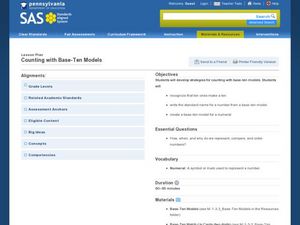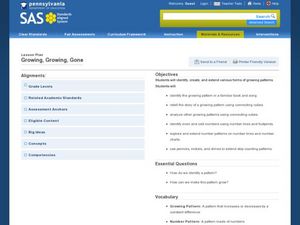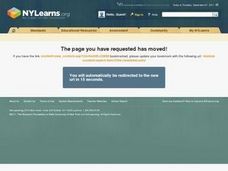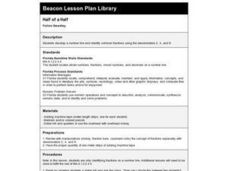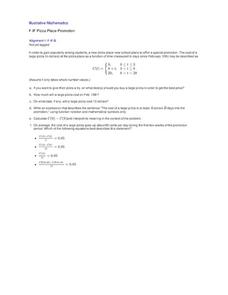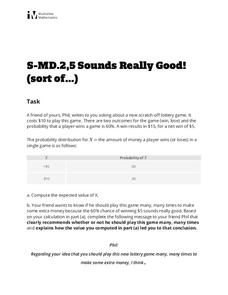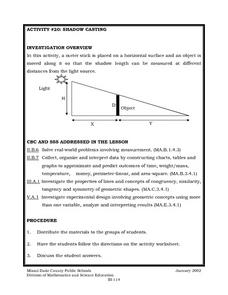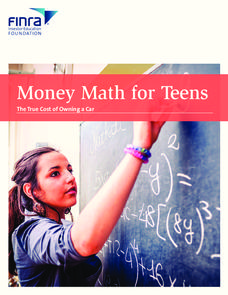Curated OER
Counting with Base - Ten Models
Help your kids develop strategies for counting. In this base-ten lesson, learners use matching cards, base 10 blocks, and dry erase markers and boards to examine the base 10 counting system.
Curated OER
Growing, Growing, Gone
Budding mathematicians identify growing patterns in numbers and songs then create their own patterns. They look at number patterns and language patterns and then create their own using money and footprints.
Curated OER
Bob's Bagel Shop
How much money can Bob expect to make per customer by selling bagels? This short expected value problem can be used as a warm up or a quick assessment at the end of a more detailed lesson. Teacher commentary includes the solution to the...
Curated OER
The Nitty-Gritty of Checkbooks
Students explore how to maintain a checking account. They control, disburse money, and keep their checking account balance. Through a PowerPoint demonstration, video streaming and hands-on practice, students apply the information given...
Curated OER
Half of a Half
After your math classes have been introduced to fractions (especially those with denominators of two, four, and eight), introduce them to fractions on a number line with this lesson. Using a meter length of tape, show your class where...
Illustrative Mathematics
Pizza Place Promotion
The longer you wait to try the new pizza place, the more it's going to cost you! This real-world problem about how the cost of pizza varies with respect to time is a good example of how piecewise functions are used to describe...
Intel
How Can I Relate?
How much is a million? This unit has a set of lessons investigating large numbers on the order of millions and billions. A culminating project has groups creating a slideshow and poster about large numbers found in the school and/or...
Curated OER
Passport to the Eastern Hemisphere
Seventh graders explore the Eastern Hemisphere. They investigate the customs, currency, climate, location and other facts needed in order to travel to a specific country. Students receive a stamp on their "passport" when their research...
Curated OER
Sounds Really Good! (sort of...)
Your friend Phil wants to know if he should play the lottery. Have your class use the given data to compute the expected value and explain to Phil what he should do and why. This handout is ideal for a quick assessment of skill and...
Curated OER
Fraction Conversion Lesson Plan
Students practice converting fractions into decimals and percents using a computer applet and the concept of money.
Curated OER
A Special Relationship
Young scholars discover the relationships of the lengths of the sides of right triangles and right triangles using a series of drawings on dot paper. They investigate and solve problems of standard (customary and metric units) and...
Curated OER
Completing Simple Tax Forms
Twelfth graders practice filling out IRS 1040 EZ forms. They discuss various ways people pay taxes. They assess the importance of W-2 forms and apply skills using the IRS tax table to compute how much money is owed or returned.
Curated OER
Shadow Casting
Eighth graders use a meter stick that is placed on a horizontal surface and an object is moved along it so that the shadow length can be measured at different distances from the light source. They solve real-world problems involving...
Curated OER
Problem Solving with the Wilderness Classroom
Students complete 45 multiple choice math word problems. In this math word problems lesson plan, students solve word problems on time, graphing, all four operations, money, and more.
Curated OER
Mathematics Within: Algebraic Patterns
Young scholars investigate the concept of using proportions to compare quantities while also practicing calculations for foreign exchange rates. They develop the skill of solving for unknown quantities of money while using an algebraic...
Curated OER
Holiday Shopping
Fourth graders find change for an amount given. In this real life subtraction lesson plan, 4th graders use an advertisement to select items to "buy." They figure out how much money they would pay the cashier and how much money they will...
SaveandInvest.org
The True Cost of Owning a Car
Almost every teen wants a car, but can they really afford one? The lesson walks pupils through how to identify a budget, find all of the costs associated with car ownership, and determine if they should buy the car or keep looking.
Balanced Assessment
Fermi Estimates II
How many hot dogs does Fenway Park go through in a year? Learners estimate answers to this question and more as they work through the task. Problems require participants to make assumptions and use those assumptions to make estimations.
Mathed Up!
Pie Charts
Representing data is as easy as pie. Class members construct pie charts given a frequency table. Individuals then determine the size of the angles needed for each sector and interpret the size of sectors within the context of frequency....
West Contra Costa Unified School District
Interest and the Number “e”
Make a connection between different types of interest and how they are calculated! This algebra II lesson progresses from simple interest to compound interest to continually compounded interest. Formulas are developed rather than given,...
Concord Consortium
Rule of 72
Find an easier way to double it. Using the price of an item and the Consumer Price Index, learners determine how long it will be for the price to double. Scholars calculate the length of time it would take for the price to double using a...
Curated OER
Model Counting Pennies and Nickels
First graders provide monetary value of coins. In this counting pennies and nickels lesson, 1st graders practice counting money with a partner.
Curated OER
A Trip to the Toy Store
First graders recognize and identify the value of a penny, nickel and dime. They spend play money in a simulated toy store and match their coins to the purchase price of a toy of their choice.
Curated OER
The Big Buck Adventure: Part 2
Students go on a pretend shopping spree. In this money lesson, students complete a Shopping Spree activity sheet where they pretend they have won $100 and can spend it on a fake shopping spree. Students use the Internet to shop and...


